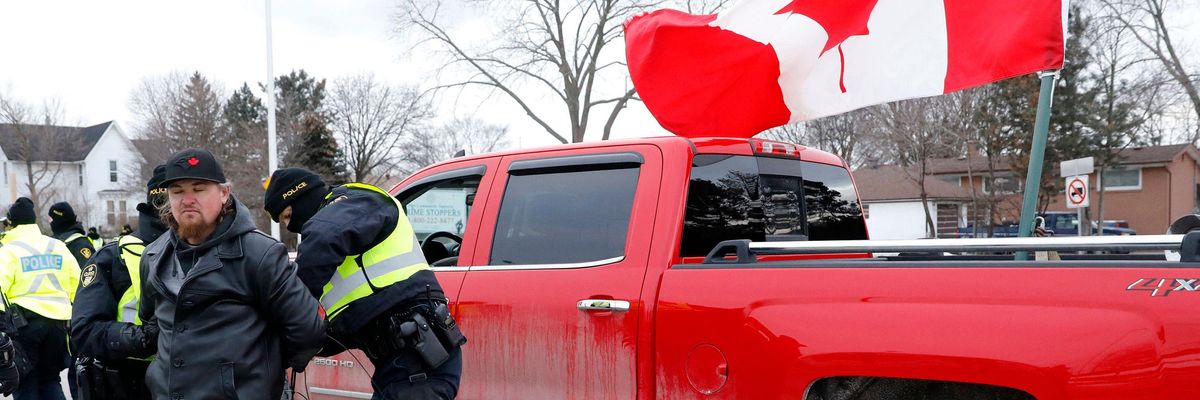In the face of accusations that Canadian officials have been too tolerant of anti-vax conspiracy theorists and anti-mandate advocates laying siege to public motorways in the country, law enforcement in Windsor, Ontario just before dawn Sunday finally began to make arrests and subsequently cleared the road leading to the U.S. border after days of protest.
According to the Windsor Star:
Police began another offensive Sunday morning, pushing south along Huron Church Road from the Ambassador Bridge to Tecumseh Road, clearing the few remaining protesters in the process.
After a relatively quiet night, police started making some arrests and towing vehicles.
"The police," reported the Toronto Star were "equipped with armoured vehicles, tear gas and rubber bullet guns, warned that protesters who did not leave would be arrested and charged with mischief."
Law enforcement first disrupted the protest encampment Saturday, but what first appeared like a stand-off later turned into what local reporters and others described as a "block party atmosphere" as police tolerated the ongoing presence and more protesters joined the fray.
Footage from the scene showed a number of vehicle leaving after the police said anyone remaining would be arrested and have their vehicle impounded:
"How hard was that?" asked political journalist and author John Ivison in response to footage of trucks departing under police threat. "Leave or be arrested."
While police appeared to have retaken complete control of the road, it was not clear when it would be reopened to regular traffic:
Thoughout the afternoon on Sunday, however, pockets of demonstrators remained even as police continued to make arrests sporadically:
The effort to end the blockade of the bridge in Windsor came as a similar "trucker protests" continued in the nation's capital city of Ottawa--where thousands gathered Saturday to voice their opposition to public health measures--and smaller demonstrations and blockades occurred elsewhere in the country. Canadian Prime Minister Justin Trudeau told those participating in such protests on Saturday that it "was time to go home," but critics have continued to say that Trudeau and other officials have been too lenient and slow in their response.
In a post on social media Saturday, Catherine McKenna, former minister of environment, climate, and infrastructure in the Trudeau government, expressed frustration over the handling of the protests.
"Amazingly this isn't just Ottawa. It's the nation's capital," McKenna tweeted. "But no one--not the city, the province, or the federal government can seem to get their act together to end this illegal occupation. It's appalling."
With many tired of government inaction, a counter-protest movement has also emerged in recent days as Canadians opposed to the libertarian "trucker convoy" movement--which represents a minority view in the country, according to polls--have decided to take matters into their own hands by blocking the blockaders. As the CBC reports on Sunday:
Counter protests began Saturday, with hundreds marching through Ottawa's Glebe neighbourhood, and continued Sunday morning as a group of people blocked a major intersection to prevent a number of vehicles from joining the main protest downtown.
The impromptu blockade began to form Sunday morning around 9 a.m. when around 20 residents stepped into the intersection at Bank Street and Riverside Drive.
The blockade grew to approximately 200 people by noon. Some carried signs saying "Go home truckers" and "Centretown neighbours deserve better."
One counter-protested, Ruva Gwekwerere told the CBC she felt she needed to do something after weeks of seeing the far-right occupiers take control of the city's center.
"It's really evident our community doesn't feel safe anymore," Gwekerere said. "I'm here with a lot of different groups from a lot of really different parts of life who are really saying 'enough has been enough.'"
Speaking with CNN on Sunday morning, freelance investigative journalist Justin Ling, who has been following the protests in Canada since they emerged last month, described just how "deranged, conspiratorial, and dangerous" the rhetoric of many participants has been.
Speaking with reporters Sunday morning, Windsor Mayor Drew Dilkens said once police dealt with the final few individuals and vehicles remaining in the area, officials would figure out how to properly re-open the roadway.
According to local reporter Katerina Georgieva, with CBC Windsor News at 6, Dilkens said demonstrators in the future would be allowed to protest from public sidewalks in the area but that "it's not okay to choke off the busiest commercial border crossing between Canada and the U.S."

